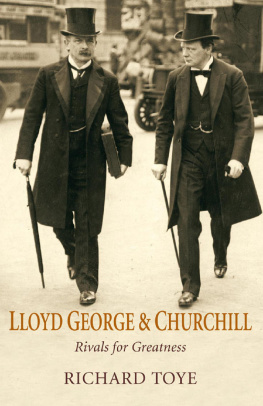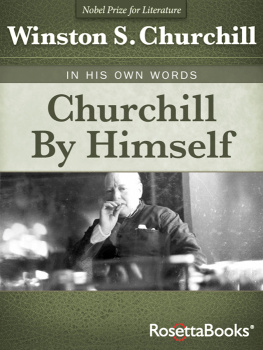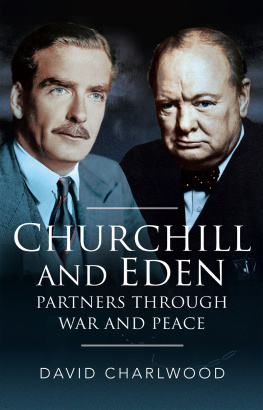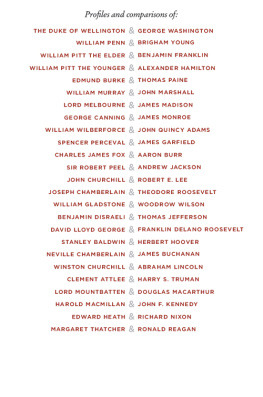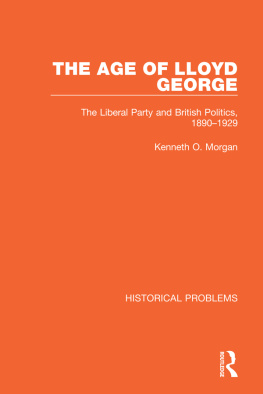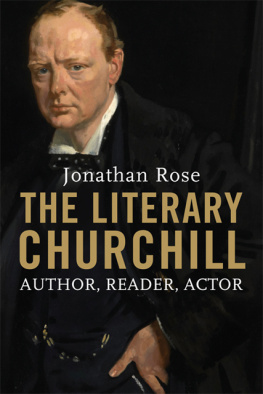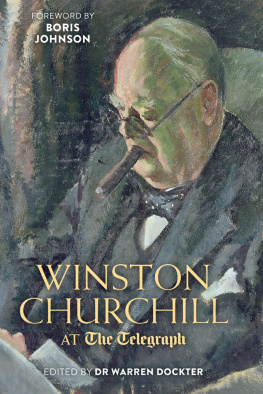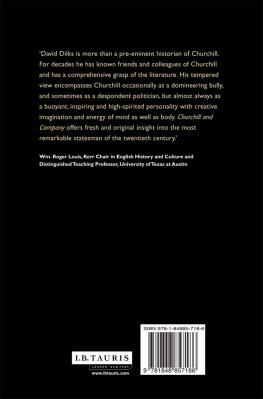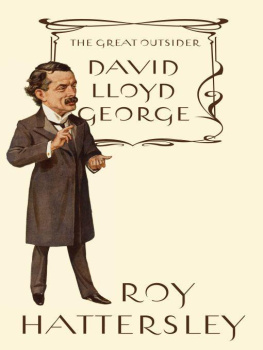LLOYD GEORGE & CHURCHILL
RICHARD TOYE is a senior lecturer in the department of history at the University of Exeter. He lives in Exeter with his wife and son.
Contents
Introduction
A Relationship and its Reputation
David Lloyd George and Winston Churchill were the two most important figures in twentieth-century British politics. Not only were both renowned wartime Prime Ministers, but they both also established impressive track records in terms of domestic reform. During the inter-war years they both spent long periods out of office, yet their exclusion from power helped cement their respective reputations as far-sighted visionaries: Lloyd George put forward ambitious plans to deal with mass unemployment, and Churchill warned against the dangers of Nazism. The link between them spanned more than four decades. The connection was not always as warm or comfortable as they themselves at various times suggested. But it was undoubtedly, for both, their most important single political relationship. Their association and intermittent alliance was a factor in the widespread distrust that these two great contemporaries attracted. They were often spoken of in the same breath, frequently in harsh terms. Talking privately in 1937, Stanley Baldwin, the Conservative Prime Minister, repeated with approval a saying he had heard: L.G. was born a cad and never forgot it; Winston was born a gentleman and never remembered it.
There were significant contrasts between the two mens characters. Lloyd George was a notorious philanderer and virtual bigamist (known as the Goat4), who sold honours to raise money for party funds; but he was also a wonderful listener, speaker and organizer. Churchill was irreproachable in his private life, but, for all his qualities, lacked Lloyd Georges gift of empathy and his interest in others. Lord Hankey, the most influential civil servant of the age, summarized the difference between them as follows: Imagine the subject of balloons crops up. Winston, without a blink, will give you a brilliant hour-long lecture on balloons. L.G., even if he has never
The two men lived during a period of fantastically rapid change. For example it was only in 1865, two years after Lloyd Georges birth, that Joseph Lister first used carbolic acid as an antiseptic during surgery. Lloyd George died, eighty years later, mere months before the explosion of the first atomic bomb. Similarly, it was only in 1876, two years after Churchill was born, that Alexander Graham Bell made the worlds first telephone call. Churchill died in the space age, eight years after the 1957 launch of the first Sputnik satellite. Technical change and social progress did not, by any means, always go hand in hand. Undoubtedly, though, the relationship between new technology and societal change influenced the landscape across which Lloyd George and Churchill moved as political actors.
It was a landscape they also helped shape. During World War I they each showed a strong interest in mechanized warfare, perhaps most notably in the development of the tank. Mechanization was an important aspect of the new era of total war, which in turn necessitated the planning of resources to meet the unprecedented demands placed upon the economy. It was in this field, in his role as Minister of Munitions (191516), that Lloyd George showed himself most startlingly inventive. (Churchill, who served in the same post in 191718, was not quite such an innovator, but still deserves considerable credit for helping to ensure that Britain had the weapons it required.) Although Lloyd George was not solely responsible for the bureaucratic revolution over which he presided, it is fair to say that the practice of British government has not been the same since.
Furthermore, the dramatic changes in technology and in the Later on, though, Churchills World War II broadcasts demonstrated an effectiveness on radio that Lloyd George never achieved.) But the willingness to reach out to the people was not without its costs, and led both men, in the pre-1914 era, to be labelled as demagogues who were ready to pander to the basest instincts of their audiences in the quest for popularity and votes. The distrust they aroused which, it must be said, was not always wholly unjustified does much to explain the course of their respective careers.
The relationship between Lloyd George and Churchill is thus not only interesting on its own terms; it also can be used as a lens through which to view some fundamental shifts in British society and politics, many of the consequences of which can still be felt today. That This may have been a slight exaggeration, but Churchills strenuous efforts to persuade Lloyd George to join his War Cabinet in 1940 pay ample testament to the latters continuing mesmeric capacity. Furthermore, a powerful mythology surrounded the relationship, and has largely been maintained since.
In the same way that they romanticized other aspects of their lives, the men themselves made an active contribution to this. Their version of the story was encapsulated to give but one example in speeches they made at a dinner in 1936, in celebration of the completion of Lloyd Georges War Memoirs. Churchill said of Lloyd George: I personally have a feeling of gratitude towards him no matter how often I am riled at the line he takes and the things he does and the differences of opinion, I can never alter my foundation based on the affection and regard I have for him. Lloyd George reciprocated in kind: in spite of the fact that we have fought against each other on many occasions there has never been an occasion when I could not call Mr. Winston Churchill my friend and I think that he could do the same.
In later years, many who had known them echoed this tale. For example, Lloyd Georges eldest son, Richard (who was in many respects a hostile critic of his father), wrote of their link of true friendship... which was to sustain every pressure. They emerge from such treatment as joint men of destiny, sometimes kept down by the jealousy of others, but personally inseparable even when trading harsh words in the rough and tumble of political life.
This master-narrative of personal constancy spiced by manly disagreements over matters of state is, superficially, very attractive. It acknowledges the mens many wrangles, but removes their bitter taste. It cannot, however, be accepted at face value. As this book will demonstrate, Lloyd George and Churchill did not always feel affection towards one another, and at crucial moments the relationship broke down. At times they were brutally frank about each others failings, and about the underlying realities of the connection between them. Lloyd George once said of Churchill: He would make a drum out of the skin of his own mother in order to sound his own praises. Yet at other moments the claim that political conflict had never descended into personal acrimony was politically convenient for both Lloyd George and Churchill; hence, in part, their displays of comradeship and protestations of mutual devotion. This is not to say that their personal connection, and the things they said about it, should be viewed in a purely cynical way. If their joint myth was in many respects misleading, they derived emotional as well as political benefits from its creation. The process of building and manipulating the image of the relationship was, in fact, central to the relationship itself.
This book provides the most detailed and systematic account to date of that relationship. It is also a book about the image, myth and reputation of the relationship. This may seem an unusual concept. We But they were not the only such entrepreneurs diarists, journalists, biographers, historians, lovers, wives, family members, and hangers-on contributed to their legend. Meanwhile, those who, like Baldwin, were hostile to Lloyd George and Churchill put their own negative spin on it, but in so doing reinforced its symbolic importance. The process by which the reputation of the relationship was established and contested, then, should be central to our understanding of the men themselves.

